2017年09月16日新SAT北美写作原文
以下是新航道 小编带来的2017年09月16日新SAT北美写作原文,一起来看看此次北美写作的原文吧!

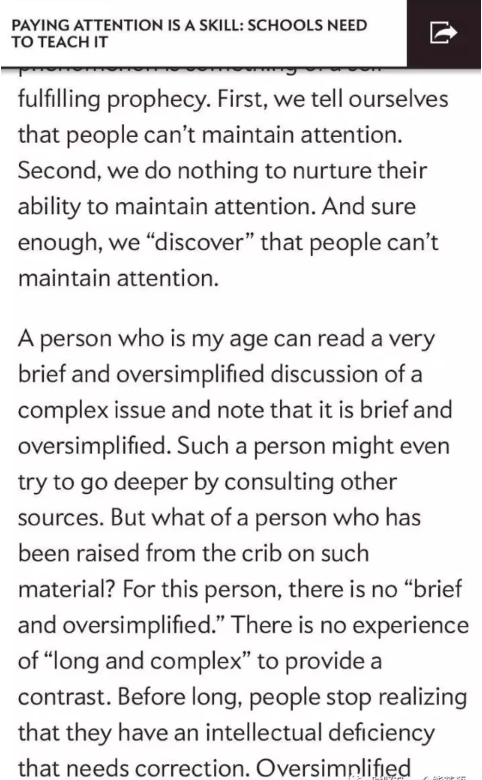
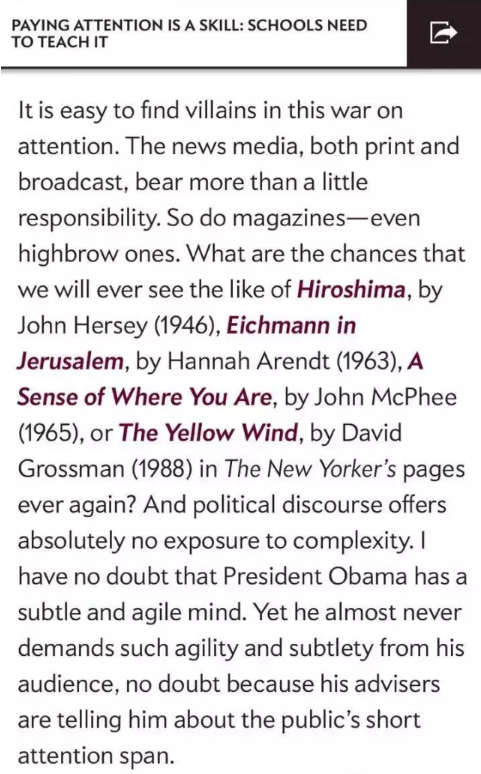
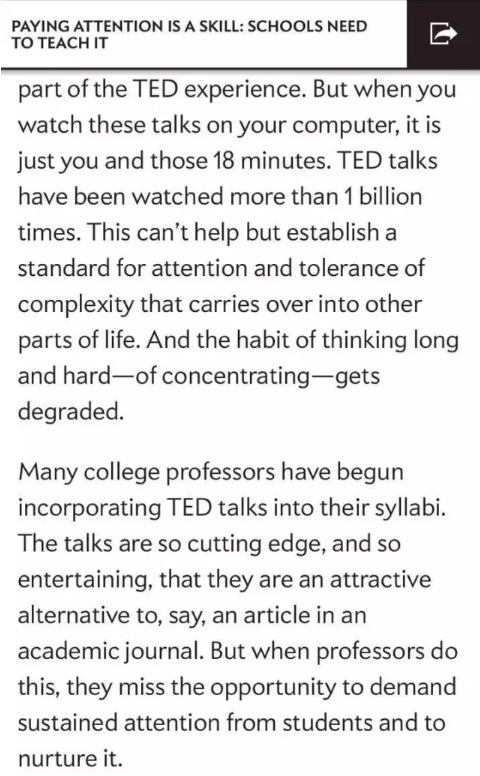


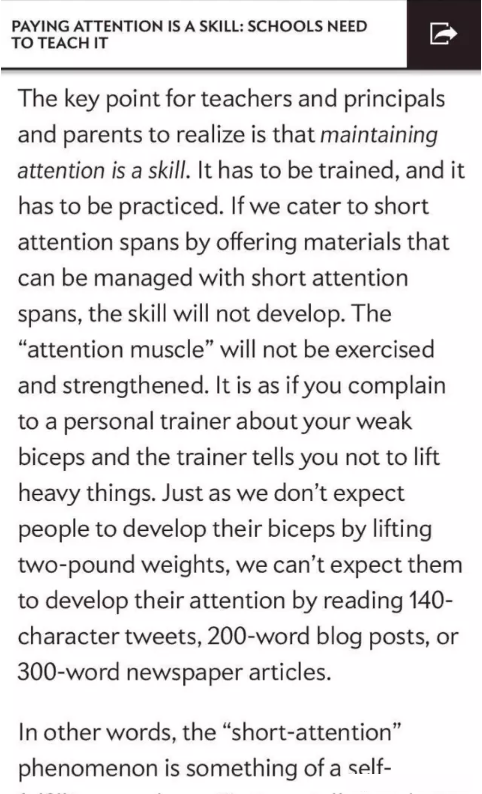
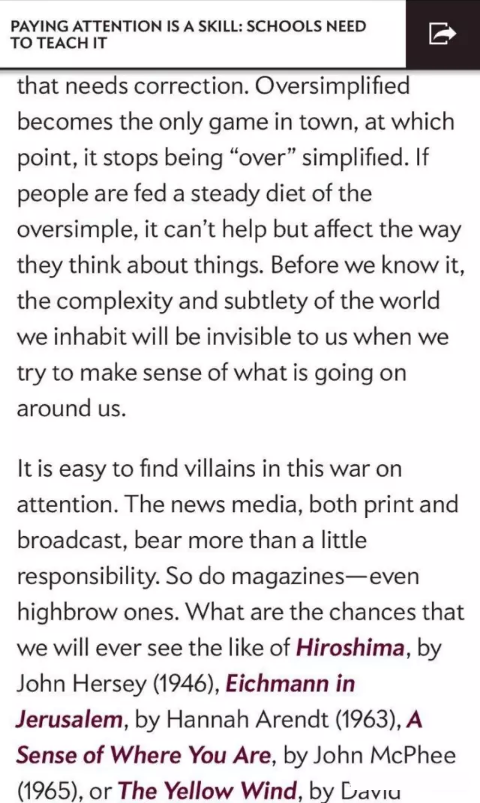
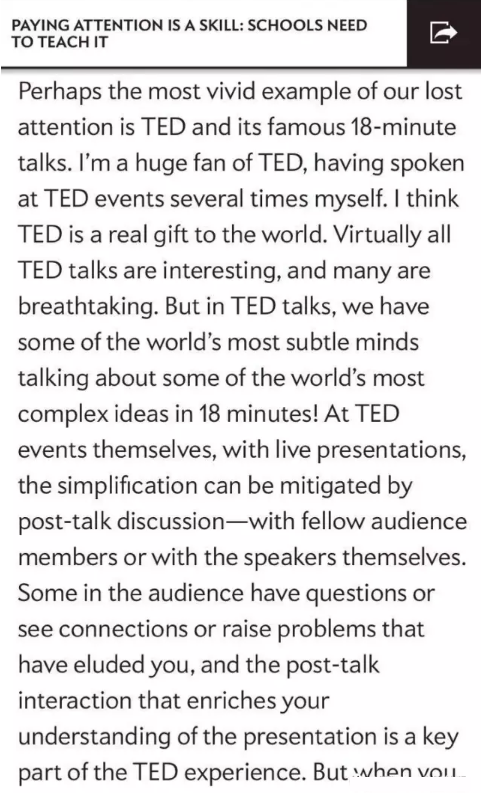
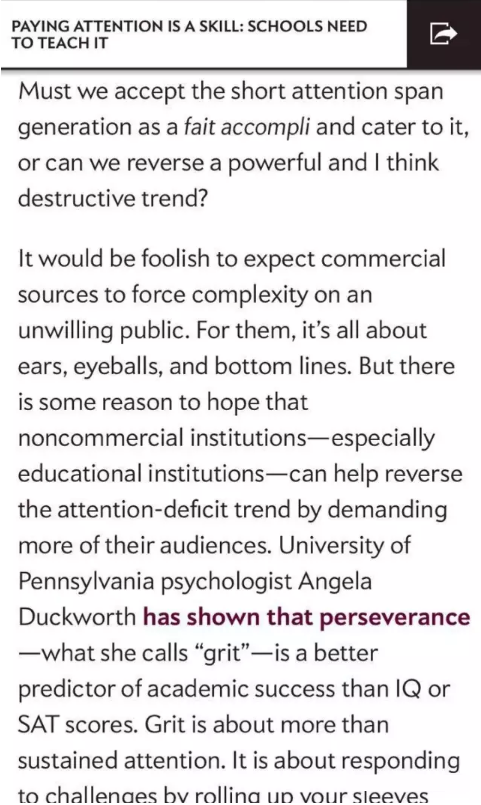
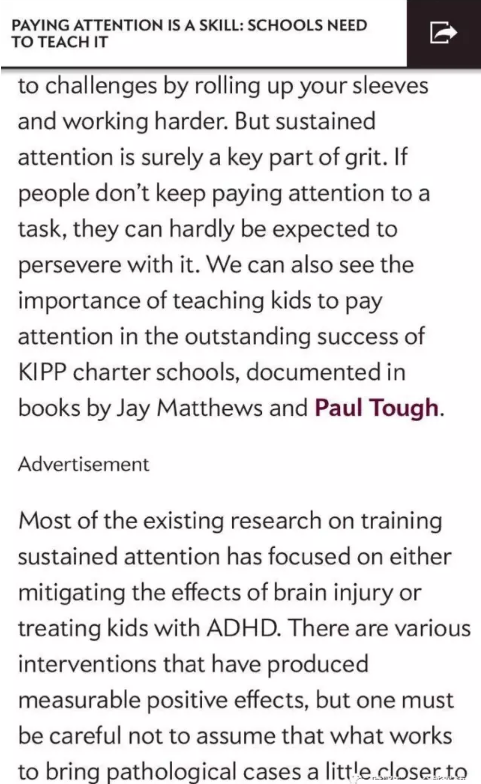
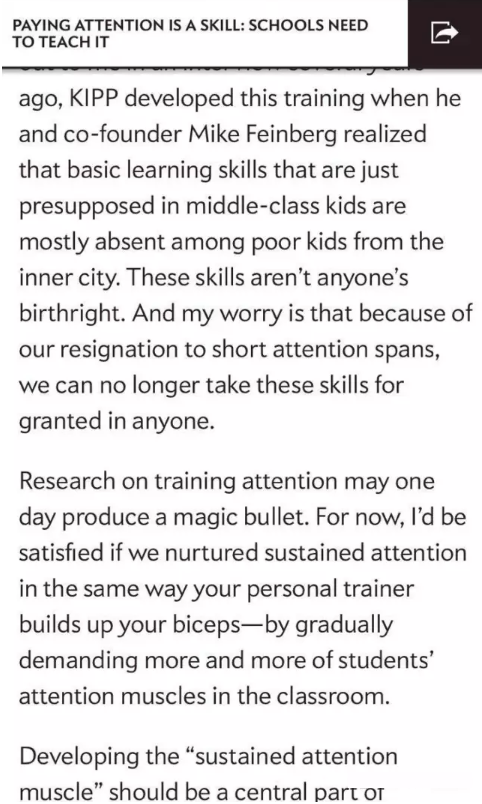
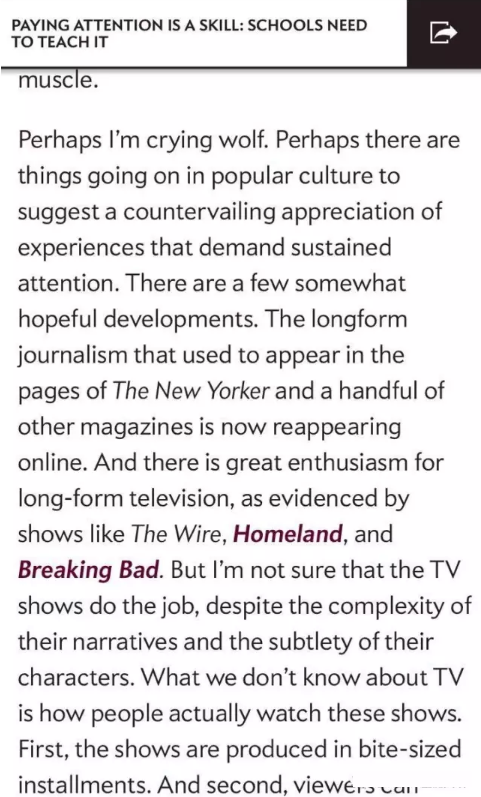
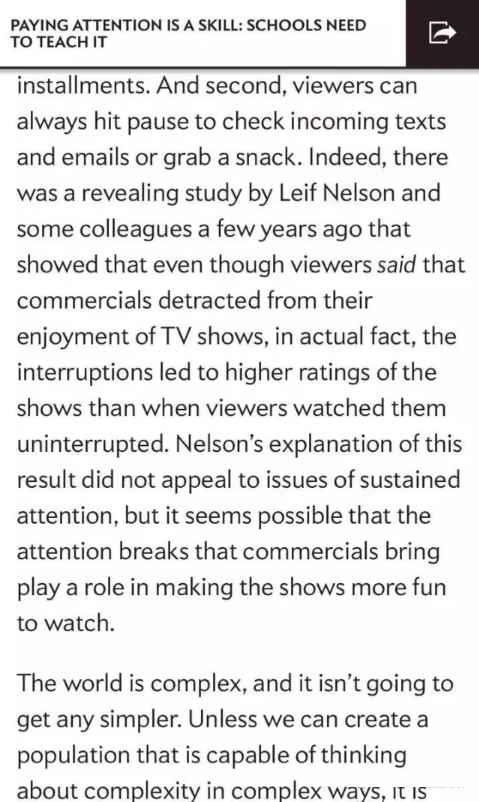
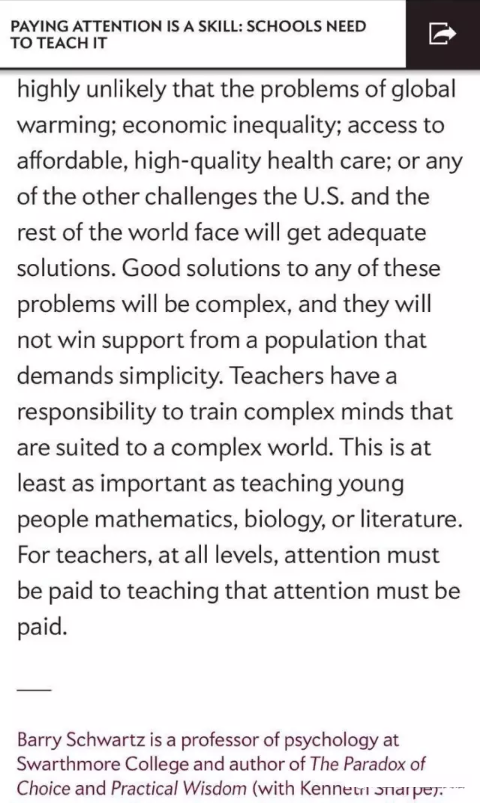
1 There is no doubt that “diminished attention” is a correct diagnosis of the intellectual temperament of our age. I see it to a greater degree each year even in the students I teach, who are among the very best that our high schools have to offer.
2 But how to treat it? Again and again, we are told in this information-overloaded digital age, complex and subtle arguments just won’t hold the reader’s or viewer’s attention. If you can’t keep it simple and punchy, you’ll lose your audience. What’s the point of having a New York Times article about the U.S. stance toward the Syria that continues on an inside page if nobody is going to turn to the inside page? Even talking about “inside pages” is anachronistic, since more and more people get their news online, with articles that are “up-to-the-minute” but frustrating in their brevity.
3 By catering to diminished attention, we are making a colossal and unconscionable mistake. The world is a complex and subtle place, and efforts to understand it and improve it must match its complexity and subtlety. We are treating as unalterable a characteristic that can be changed. Yes, there is no point in publishing a long article if no one will read it to the end. The question is, what does it take to get people to read things to the end?
4 The key point for teachers and principals and parents to realize is thatmaintaining attention is a skill. It has to be trained, and it has to be practiced. If we cater to short attention spans by offering materials that can be managed with short attention spans, the skill will not develop. The “attention muscle” will not be exercised and strengthened. It is as if you complain to a personal trainer about your weak biceps and the trainer tells you not to lift heavy things. Just as we don’t expect people to develop their biceps by lifting two-pound weights, we can’t expect them to develop their attention by reading 140-character tweets, 200-word blog posts, or 300-word newspaper articles.
5 In other words, the “short-attention” phenomenon is something of a self-fulfilling prophecy. First, we tell ourselves that people can’t maintain attention. Second, we do nothing to nurture their ability to maintain attention. And sure enough, we “discover” that people can’t maintain attention.
6 A person who is my age can read a very brief and oversimplified discussion of a complex issue and note that it is brief and oversimplified. Such a person might even try to go deeper by consulting other sources. But what of a person who has been raised from the crib on such material? For this person, there is no “brief and oversimplified.” There is no experience of “long and complex” to provide a contrast. Before long, people stop realizing that they have an intellectual deficiency that needs correction. Oversimplified becomes the only game in town, at which point, it stops being “over” simplified. If people are fed a steady diet of the oversimple, it can’t help but affect the way they think about things. Before we know it, the complexity and subtlety of the world we inhabit will be invisible to us when we try to make sense of what is going on around us.
7 It is easy to find villains in this war on attention. The news media, both print and broadcast, bear more than a little responsibility. So do magazines—even highbrow ones. What are the chances that we will ever see the like ofHiroshima, by John Hersey (1946), Eichmann in Jerusalem, by Hannah Arendt (1963), A Sense of Where You Are, by John McPhee (1965), or The Yellow Wind, by David Grossman (1988) in The New Yorker’s pages ever again? And political discourse offers absolutely no exposure to complexity. I have no doubt that President Obama has a subtle and agile mind. Yet he almost never demands such agility and subtlety from his audience, no doubt because his advisers are telling him about the public’s short attention span.
8 Perhaps the most vivid example of our lost attention is TED and its famous 18-minute talks. I’m a huge fan of TED, having spoken at TED events several times myself. I think TED is a real gift to the world. Virtually all TED talks are interesting, and many are breathtaking. But in TED talks, we have some of the world’s most subtle minds talking about some of the world’s most complex ideas in 18 minutes! At TED events themselves, with live presentations, the simplification can be mitigated by post-talk discussion—with fellow audience members or with the speakers themselves. Some in the audience have questions or see connections or raise problems that have eluded you, and the post-talk interaction that enriches your understanding of the presentation is a key part of the TED experience. But when you watch these talks on your computer, it is just you and those 18 minutes. TED talks have been watched more than 1 billion times. This can’t help but establish a standard for attention and tolerance of complexity that carries over into other parts of life. And the habit of thinking long and hard—of concentrating—gets degraded.
9 Many college professors have begun incorporating TED talks into their syllabi. The talks are so cutting edge, and so entertaining, that they are an attractive alternative to, say, an article in an academic journal. But when professors do this, they miss the opportunity to demand sustained attention from students and to nurture it.
10 Must we accept the short attention span generation as a fait accompli and cater to it, or can we reverse a powerful and I think destructive trend?
11 It would be foolish to expect commercial sources to force complexity on an unwilling public. For them, it’s all about ears, eyeballs, and bottom lines. But there is some reason to hope that noncommercial institutions—especially educational institutions—can help reverse the attention-deficit trend by demanding more of their audiences. University of Pennsylvania psychologist Angela Duckworth has shown that perseverance—what she calls “grit”—is a better predictor of academic success than IQ or SAT scores. Grit is about more than sustained attention. It is about responding to challenges by rolling up your sleeves and working harder. But sustained attention is surely a key part of grit. If people don’t keep paying attention to a task, they can hardly be expected to persevere with it. We can also see the importance of teaching kids to pay attention in the outstanding success of KIPP charter schools, documented in books by Jay Matthews and Paul Tough.
12 Most of the existing research on training sustained attention has focused on either mitigating the effects of brain injury or treating kids with ADHD. There are various interventions that have produced measurable positive effects, but one must be careful not to assume that what works to bring pathological cases a little closer to normal will also work with normal cases, especially since the problems with brain-injured and ADHD people are likely mostly cognitive whereas the problems I’m worrying about are probably mostly motivational. When it comes to normal people, there is evidence that training in mindfulness meditation improves sustained attention.
13 There is also evidence, some of it collected by Duckworth and colleagues, that giving kids not only task goals, but detailed plans for achieving those goals improves sustained attention. And in the KIPP schools, they teach first-graders to pay attention by training them to SLANT (Sit up, Look and Listen to the speaker, Ask questions, Nod, and Track the teacher). As Dave Levin, one of KIPPs founders, pointed out to me in an interview several years ago, KIPP developed this training when he and co-founder Mike Feinberg realized that basic learning skills that are just presupposed in middle-class kids are mostly absent among poor kids from the inner city. These skills aren’t anyone’s birthright. And my worry is that because of our resignation to short attention spans, we can no longer take these skills for granted in anyone.
14 Research on training attention may one day produce a magic bullet. For now, I’d be satisfied if we nurtured sustained attention in the same way your personal trainer builds up your biceps—by gradually demanding more and more of students’ attention muscles in the classroom.
15 Developing the “sustained attention muscle” should be a central part of education. Is there any evidence that it is? I fear not, and I think that recent trends are not encouraging. In universities, value is placed on being a popular teacher who commands large enrollments. One doesn’t do that by demanding sustained engagement with difficult material. And MOOCs, whatever their potential cost-saving benefits, enable students to watch presentations in brief snatches, perfect for the attentionally challenged, which in turn pressures instructors to organize their material in matching, bite-sized portions. We all let students bring their laptops into class, which virtually guarantees that they will be shuttling between email and web surfing while occasionally taking notes on what is being said. None of this is a recipe for strengthening the sustained attention muscle.
16 Perhaps I’m crying wolf. Perhaps there are things going on in popular culture to suggest a countervailing appreciation of experiences that demand sustained attention. There are a few somewhat hopeful developments. The longform journalism that used to appear in the pages of The New Yorker and a handful of other magazines is now reappearing online. And there is great enthusiasm for long-form television, as evidenced by shows like The Wire, Homeland, andBreaking Bad. But I’m not sure that the TV shows do the job, despite the complexity of their narratives and the subtlety of their characters. What we don’t know about TV is how people actually watch these shows. First, the shows are produced in bite-sized installments. And second, viewers can always hit pause to check incoming texts and emails or grab a snack. Indeed, there was a revealing study by Leif Nelson and some colleagues a few years ago that showed that even though viewers said that commercials detracted from their enjoyment of TV shows, in actual fact, the interruptions led to higher ratings of the shows than when viewers watched them uninterrupted. Nelson’s explanation of this result did not appeal to issues of sustained attention, but it seems possible that the attention breaks that commercials bring play a role in making the shows more fun to watch.
17 The world is complex, and it isn’t going to get any simpler. Unless we can create a population that is capable of thinking about complexity in complex ways, it is highly unlikely that the problems of global warming; economic inequality; access to affordable, high-quality health care; or any of the other challenges the U.S. and the rest of the world face will get adequate solutions. Good solutions to any of these problems will be complex, and they will not win support from a population that demands simplicity. Teachers have a responsibility to train complex minds that are suited to a complex world. This is at least as important as teaching young people mathematics, biology, or literature. For teachers, at all levels, attention must be paid to teaching that attention must be paid.
-----------Barry Schwartz is a professor of psychology at Swarthmore College and author of The Paradox of Choice and Practical Wisdom(with Kenneth Sharpe).
2017年9月16日部分阅读考回
篇是关于一个家庭搬进新家的几段回忆。
第二篇是overplay的分析。
第三篇是evolution双篇,难度不大。
第四篇论自由,较难,原文节选从45页it is not by wearing到46页hinderance。
It is not by wearing down into uniformity all that is individual in themselves, but by cultivating it and calling it forth, within the limits imposed by the rights and interests of others, that human beings become a noble and beautiful object of contemplation; and as the works partake the character of those who do them, by the same process human life also becomes rich, diversified, and animating, furnishing more abundant aliment to high thoughts and elevating feelings, and strengthening the tie which binds every individual to the race, by making the race infinitely better worth belonging to. In proportion to the development of his individuality, each person becomes more valuable to himself, and is therefore capable of being more valuable to others. There is a greater fulness of life about his own existence, and when there is more life in the units there is more in the mass which is composed of them. As much compression as is necessary to prevent the stronger specimens of human nature from encroaching on the rights of others, cannot be dispensed with; but for this there is ample compensation even in the point of view of human development. The means of development which the individual loses by being prevented from gratifying his inclinations to the injury of others, are chiefly obtained at the expense of the development of other people. And even to himself there is a full equivalent in the better development of the social part of his nature, rendered possible by the restraint put upon the selfish part. To be held to rigid rules of justice for the sake of others, develops the feelings and capacities which have the good of others for their object. But to be restrained in things not affecting their good, by their mere displeasure, develops nothing valuable, except such force of character as may unfold itself in resisting the restraint. If acquiesced in, it dulls and blunts the whole nature. To give any fair play to the nature of each, it is essential that different persons should be allowed to lead different lives. In proportion as this latitude has been exercised in any age, has that age been noteworthy to posterity. Even despotism does not produce its worst effects, so long as Individuality exists under it; and whatever crushes individuality is despotism, by whatever name it may be called, and whether it professes to be enforcing the will of God or the injunctions of men.
真题下载:









